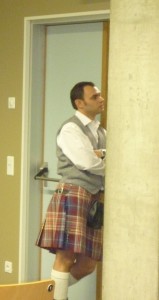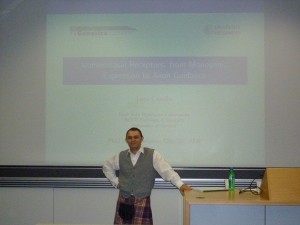
I mentioned this briefly yesterday, but now I'll try to summarize the
story of a great surprise and a big moment for me.
All this started when my wife
Elizabeth and my son Jean-Baptiste wanted to do something special for
my 50th birthday. So, it indeed all started months ago, probably early
March or something (I don't yet have all the details).
Jean-Baptiste described this well on the web site, so I won't go again
into details, but basically, this was about getting birthday
wishes from my "free software family" in, as you might guess, as many
languages as possible.
Elizabeth brought the original idea and JB helped her by setting up
the website and collecting e-mail addresses of people I usually work
with: he grabbed addresses from PO files on Debian website, plus some
in his own set of GPG signatures and here we go. And then he started poking
dozens of you folks in order to get your wishes for this birthday.
Gradually, contributions accumulated on the website, with
many challenges for them: be sure to get as many people as possible,
poking and re-poking all those FLOSS people who keep forgetting
things... It seems that poking people is something that's probably in
the Perrier's genes!
And they were doing all this without me noticing.
As usually in Debian, releasing on time is a no-no. So, it quickly
turned out that having everything ready by April 2nd wouldn't be
possible. So, their new goal was offering this to me on Pentecost
Sunday, which was yesterday. And...here comes the gift.
Aha, this looks like a photo album. Could it be a "50 years of
Christian" album?
But, EH, why is that pic of me, with the red Debconf5 tee-shirt (that
features a world map) and a "bubulle" sign, in front of the book?
But, EH EH EH, what the .... are doing these word by H0lger, then Fil,
then Joey doing on the following pages?
And only then, OMG, I discover the real gift they prepared. 106, often
bilingual, wishes from 110 people (some were couples!). 18 postcards
(one made of wood). 45 languages. One postcard with wishes from nearly every distro
representatives at LinuxTag 2011. Dozens of photos from my friends all
around the world. All this in a wonderful album.
I can't tell what I said. Anyway, JB was shooting a video, so...we'll see. OK, I didn't cry...but it wasn't that far and
emotion was really really intense.
Guys, ladies, gentlemen, friends....it took me a while to realize what
you contributed to. It took me the entire afternoon to realize the
investment put by Elizabeth and JB (and JB's sisters support) into
this. Yes, as many of you wrote, I have an awesome family and they
really know how to share their love. I also have an awesome virtual
family all around the world. Your words are wholeheartedly appreciated
and some were indeed much much much appreciated.
Of course, I'll have the book in Banja Luka so that you can see the
result. I know (because JB and Elizabeth told me) that many of you
were really awaiting to see how it would be received (yes, that
includes you, in Germany, who I visited in early May!!!).
Again, thank you so much for this incredible gift. Thank you Holger Levsen, Phil Hands, Joey Hess, Lior Kaplan, Martin
Michlmayr, Alberto Gonzalez Iniesta, Kenshi "best friend" Muto,
Praveen Arimbrathodiyil, Felipe Augusto van de Wiel, Ana Carolina
Comandulli (5 postcards!), Stefano Zacchiroli (1st contribution
received by JB, of course), Gunnar Wolf, Enriiiiiico Zini, Clytie Siddall,
Frans Pop (by way of Clytie), Tenzin Dendup, Otavio Salvador, Neil
McGovern, Konstantinos Margaritis, Luk Claes, Jonas Smedegaard, Pema
Geyleg, Meike "sp tzle queen" Reichle, Alexander Reichle-Schmehl,
Torsten Werner, "nette BSD" folks, CentOS Ralph and
Brian, Fedora people, SUSE's Jan, Ubuntu's Lucia Tamara, Skolelinux'
Paul, Rapha l Hertzog, Lars Wirzenius, Andrew McMillan (revenge in
September!), Yasa Giridhar Appaji Nag (now I know my name in Telugu),
Amaya Rodrigo, St phane Glondu, Martin Krafft, Jon "maddog" Hall (and
God save the queen), Eddy Petri or, Daniel Nylander, Aiet Kolkhi,
Andreas "die Katze geht in die K che, wunderbar" Tille, Paul "lets
bend the elbow" Wise, Jordi "half-marathon in Banja Luka" Mallach,
Steve "as ever-young as I am" Langasek, Obey Arthur Liu, YAMANE
Hideki, Jaldhar H. Vyas, Vikram Vincent, Margarita "Bronx
cross-country queen" Manterola, Patty Langasek, Aigars Mahinovs
(finding a pic *with* you on it is tricky!), Thepittak
Karoonboonyanan, Javier "nobody expects the Spanish inquisition"
Fern ndez-Sanguino, Varun Hiremath, Moray Allan, David Moreno Garza,
Ralf "marathon-man" Treinen, Arief S Fitrianto, Penny Leach, Adam
D. Barrat, Wolfgang Martin Borgert, Christine "the mentee overtakes
the mentor" Spang, Arjuna Rao Chevala, Gerfried "my best contradictor"
Fuchs, Stefano Canepa, Samuel Thibault, Eloy "first samba maintainer"
Par s, Josip Rodin, Daniel Kahn Gillmor, Steve McIntyre, Guntupalli
Karunakar, Jano Gulja , Karolina Kali , Ben Hutchings, Matej Kova i ,
Khoem Sokhem, Lisandro "I have the longest name in this list" Dami n
Nicanor P rez-Meyer, Amanpreet Singh Alam, H ctor Or n, Hans
Nordhaugn, Ivan Mas r, Dr. Tirumurti Vasudevan, John "yes, Kansas is
as flat as you can imagine" Goerzen, Jean-Baptiste "Piwet" Perrier,
Elizabeth "I love you" Perrier, Peter Eisentraut, Jesus "enemy by
nature" Climent, Peter Palfrader, Vasudev Kamath, Miroslav "Chicky"
Ku e, Mart n Ferrari, Ollivier Robert, Jure uhalev, Yunqiang Su,
Jonathan McDowell, Sampada Nakhare, Nayan Nakhare, Dirk "rendez-vous
for Chicago marathon" Eddelbuettel, Elian Myftiu, Tim Retout, Giuseppe
Sacco, Changwoo Ryu, Pedro Ribeoro, Miguel "oh no, not him again" Figueiredo, Ana Guerrero,
Aur lien Jarno, Kumar Appaiah, Arangel Angov, Faidon Liambotis, Mehdi
Dogguy, Andrew Lee, Russ Allbery, Bj rn Steensrud, Mathieu Parent,
Davide Viti, Steinar H. Gunderson, Kurt Gramlich, Vanja Cvelbar, Adam
Conrad, Armi Be irovi , Nattie Mayer-Hutchings, Joerg "dis shuld be
REJECTed" Jaspert and Luca Capello.
Let's say it gain:
- Danke
- Thank you
- (RTL or not?) / toda
- Gracias
- / arigat
- / n ndi
- Obrigado
- Grazie
- C m n
- Kadin chey la
- / Efharisto
- Dank je wel
- Tak
- D ngge
- Merci
- Kiitos
- Tika hoki
- / dhanyavaadhamulu
- Thank you and God save the Queen
- Mul umesc
- Tack
- / didi madloba
- Gr cies
- Dakujem
- / Aabhar
li> / Dhanyavadagalu
- Paldies
- / kop khun krap
- Terima kasih
- Hvala (hr)
- / Dhanyavad
- / Hvala (sr)
- Hvala (sl)
- / Akun
- / Sukriya
- Takk
- / Nandri
- Maki biyen jianbakik
- D kuji
- / Xiexie
- / Aabhari aahe
- Faleminderit
- / Kam sah ham ni da
- / Blagodaram
- / Xiexie
- Hvala (bs)
 A couple of years ago, I moved into a new flat that comes with RJ45 sockets wired for 10 Gigabit (but currently offering 1 Gigabit) Ethernet.This also meant changing the settings on my router box for my new ISP.I took this opportunity to review my router's other settings too. I'll be blogging about these over the next few posts.
Migrating to Predictable Network Interface Names
Ever since Linus decided to flip the network interface enumeration order in the Linux kernel, I had been relying on udev's persistent network interface rules to maintain some semblance of consistency in the NIC naming scheme of my hosts. It has never been a totally satisfactory method, since it required manually editing the file to list the MAC addresses of all Ethernet cards and WiFi dongles likely to appear on that host to consistently use an easy-to-remember name that I could adopt for ifupdown configuration files.
Enter predictable interface names. What started as a Linux kernel module project at Dell was eventually re-implemented in systemd. However, clear documentation on the naming scheme had been difficult to find and udev's persistent network interface rules gave me what I needed, so I postponed the transition for years. Relocating to a new flat and rethinking my home network to match gave me an opportunity to revisit the topic.
The naming scheme is surprisingly simple and logical, once proper explanations have been found. The short version:
A couple of years ago, I moved into a new flat that comes with RJ45 sockets wired for 10 Gigabit (but currently offering 1 Gigabit) Ethernet.This also meant changing the settings on my router box for my new ISP.I took this opportunity to review my router's other settings too. I'll be blogging about these over the next few posts.
Migrating to Predictable Network Interface Names
Ever since Linus decided to flip the network interface enumeration order in the Linux kernel, I had been relying on udev's persistent network interface rules to maintain some semblance of consistency in the NIC naming scheme of my hosts. It has never been a totally satisfactory method, since it required manually editing the file to list the MAC addresses of all Ethernet cards and WiFi dongles likely to appear on that host to consistently use an easy-to-remember name that I could adopt for ifupdown configuration files.
Enter predictable interface names. What started as a Linux kernel module project at Dell was eventually re-implemented in systemd. However, clear documentation on the naming scheme had been difficult to find and udev's persistent network interface rules gave me what I needed, so I postponed the transition for years. Relocating to a new flat and rethinking my home network to match gave me an opportunity to revisit the topic.
The naming scheme is surprisingly simple and logical, once proper explanations have been found. The short version:
 For a long time I ve wanted an ssh-agent setup that would ask me before every use, so I could slightly more comfortably forward authentication over SSH without worrying that my session might get hijacked somewhere at the remote end (I often find myself wanting to pull authenticated git repos on remote hosts). I m at DebConf this week, which is an ideal time to dig further into these things, so I did so today. As is often the case it turns out this is already possible, if you know how.
I began with a setup that was using GNOME Keyring to manage my SSH keys. This isn t quite what I want (eventually I want to get to the point that I can sometimes forward a GPG agent to remote hosts for signing purposes as well), so I set about setting up gpg-agent. I used Chris excellent guide to
For a long time I ve wanted an ssh-agent setup that would ask me before every use, so I could slightly more comfortably forward authentication over SSH without worrying that my session might get hijacked somewhere at the remote end (I often find myself wanting to pull authenticated git repos on remote hosts). I m at DebConf this week, which is an ideal time to dig further into these things, so I did so today. As is often the case it turns out this is already possible, if you know how.
I began with a setup that was using GNOME Keyring to manage my SSH keys. This isn t quite what I want (eventually I want to get to the point that I can sometimes forward a GPG agent to remote hosts for signing purposes as well), so I set about setting up gpg-agent. I used Chris excellent guide to 
 This is my monthly summary of my free software related activities. If you re among the people who
This is my monthly summary of my free software related activities. If you re among the people who  I mentioned this briefly yesterday, but now I'll try to summarize the
story of a great surprise and a big moment for me.
I mentioned this briefly yesterday, but now I'll try to summarize the
story of a great surprise and a big moment for me.
 Closing advice: beside some last minute legwork, I did
essentially nothing to organize this mini-DebConf, your kudos
should be better directed to
Closing advice: beside some last minute legwork, I did
essentially nothing to organize this mini-DebConf, your kudos
should be better directed to  Update 20100618: Added Debconf info.
Update 20100618: Added Debconf info.
 The famous
The famous  On Wednesday I got DAM approval and since Saturday late evening
On Wednesday I got DAM approval and since Saturday late evening  He might too shy to tell everybody, but the world must know. Luca Capello successfully defended his PhD thesis today at Universit de Gen ve, getting a Tr s Bien mention.
I must admit that my last biology lesson was 13 years ago, so I m not sure I can really comment on his work on Vomeronasal Receptors: from Monogenic Expression to Axon Guidance. But I was very impressed by the quality of the experimental process, especially compared to what we do in computer science.
Debian was well represented at the defense, since Axel Beckert, Didier Raboud and the Debian kilt were also there.
Welcome to the list of Debian Developers holding PhD degrees, Luca!
He might too shy to tell everybody, but the world must know. Luca Capello successfully defended his PhD thesis today at Universit de Gen ve, getting a Tr s Bien mention.
I must admit that my last biology lesson was 13 years ago, so I m not sure I can really comment on his work on Vomeronasal Receptors: from Monogenic Expression to Axon Guidance. But I was very impressed by the quality of the experimental process, especially compared to what we do in computer science.
Debian was well represented at the defense, since Axel Beckert, Didier Raboud and the Debian kilt were also there.
Welcome to the list of Debian Developers holding PhD degrees, Luca!

